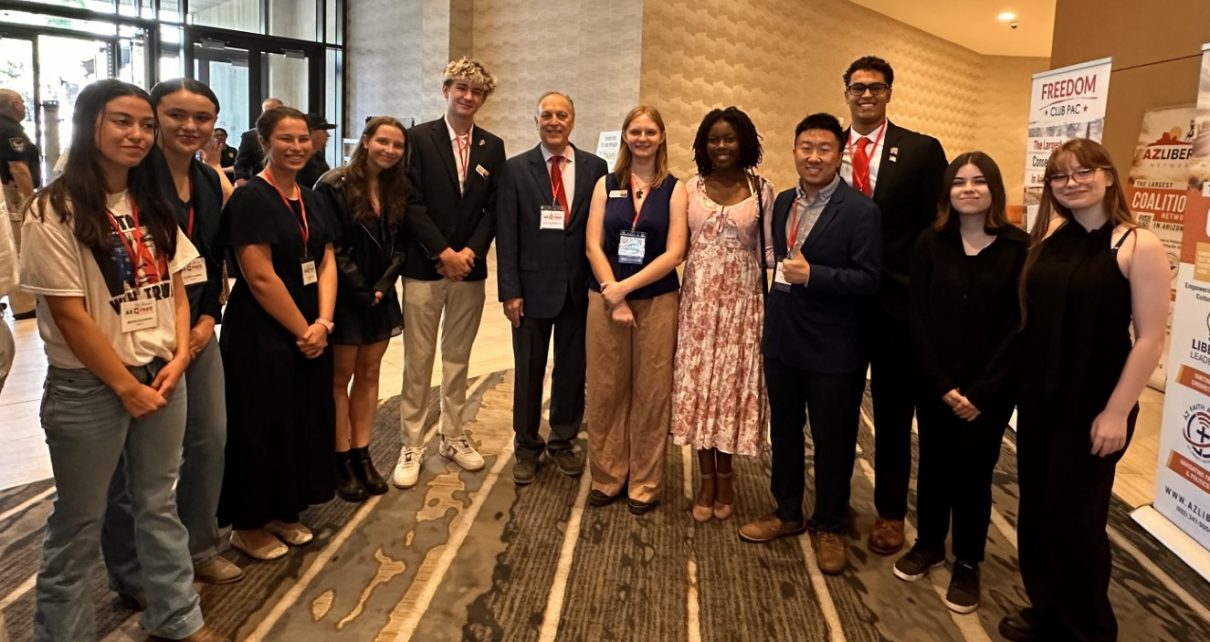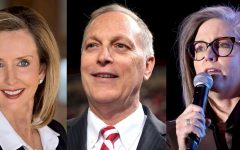
Congressman Andy Biggs. poses with Teen Republicans at the 5th Annual AFEC Summit Spetember 20, 2025. (Photo Christy Kelly for Arizona Globe)
The 2026 GOP Primary is a Must Watch for Republicans
Ultimately, can a true conservative like Biggs win in a purple swing state?
By Steve Kirwan, October 6, 2025 5:34 pm
The Arizona governor’s race is now firmly in the “must watch” category for 2026. Despite once being reliably Republican, the state has become increasingly competitive — Democrats now hold the governor’s office, attorney general, and secretary of state, although Republicans still control the state legislature. Democrat incumbent Katie Hobbs, who won narrowly in 2022, may be vulnerable due to her veto record and support for far-left policies. Republicans view the 2026 contest as a winnable pickup, so the GOP primary winner will be crucial to its chances.
Constitutional changes resulting from Proposition 131, which passed in 2022, mean that the 2026 race will be the first election in which gubernatorial candidates must run with a lieutenant governor on a joint ticket. As of now, three Republicans have declared to run for governor, but none have indicated who they will select as their running mate.
Karrin Taylor Robson was the first to announce, receiving a rare dual endorsement from then President-elect Trump. Robson is a wealthy business executive and lobbyist with deep ties to the political donor class. Robson ran in the 2022 GOP primary, losing to Kari Lake, who ultimately lost to Hobbs in a highly contested race.
Congressman Andy Biggs’ entrance into the race offered a far more conservative option. He received the second half of Trump’s dual endorsement. Trump stated that he endorsed Robson because she was the only Republican candidate at the time. Since then, he’s stated that he supports Biggs because of his alignment with the party’s MAGA wing.
Congressman David Schweikert, a self-declared conservative, announced his entrance into the Republican primary. As noted in the Arizona Globe article, Schweikert has “a solid reputation as a fiscal conservative with a focus on tax policy, federal spending, and regulatory restraint.” Some conservatives have expressed concerns about Schweikert, worried that he may draw enough away from Biggs to allow Robson to squeak by and win. However, polling shows Bibbs leading in a three-way contest with Biggs, Robson, and Schweikert.
Trump’s dual endorsement of Robson and Biggs is highly unusual, signaling an internal split in GOP alignment. However, at least in the short term, Biggs is besting the other two and is likely to face Hobbs in the General election. Polling is still early, but specific trends are emerging:
In early polling, Biggs trailed Robson. According to Noble Predictive Insights (NPI), a May 2025 poll showed Robson leading the GOP field with 24%, while Biggs trailed at 17%. However, the poll also revealed that the majority of Republicans remained undecided. Another poll from AZFamily echoed similar numbers (Robson 24%, Biggs 17%) and noted that Hobbs held a slim edge in hypothetical matchups, but also showed a significant undecided vote.
Since those earlier polls, momentum has shifted in Biggs’s favor, particularly after he received a rousing endorsement from the late Turning Point USA founder Charlie Kirk. So, despite Robson’s funding lead, Biggs has received the larger share of undecided voters, mostly MAGA supporters, and is currently in the lead.
In the general election, if Biggs wins the primary, he will need to show that he isn’t too narrowly ideological and rigid to win statewide. However, if he can mobilize the Turning Point vote-chasing machine, which is based in Arizona, TPUSA’s home state, he is likely to beat Hobbs.
Both Hobbs and the ultimate winner of the GOP primary will need to convince voters on key issues such as border security, immigration, education, and economic recovery. The differences between the positions held by the Democrats and the GOP could not be more evident. Still, the candidates will need to fight to establish their own credibility in those areas without alienating swing voters.
Hobbs remains defensible, but not impregnable. Her approval ratings, handling of state issues, and ability to mobilize turnout will matter. Many GOP strategists see her as beatable — but only with the right opponent and a favorable turnout environment.
At this stage, the Arizona Republican gubernatorial primary remains open and volatile. Robson currently holds the advantage in funding and connections to the donor class, but Biggs is strategically positioned to challenge based on his MAGA boafides. Schweikert’s candidacy adds unpredictability — it remains to be seen if he will siphon establishment or moderate support away from Robson, or win over the conservatives who want drastic policy changes.
In the general election, much will depend on the GOP nominee’s ability to expand beyond the conservative base and appeal to Arizona’s unaffiliated and moderate voters. If Republicans get the primary right, 2026 could be a significant pickup opportunity. But fracturing within the party would play right into Hobbs’ hands, and she could emerge the winner in a close, high-stakes rematch.
- Robson Drops AZ Gov Bid as Biggs Unifies GOP - February 13, 2026
- AZ GOP and DEMS Clash over Unborn Child Legislation - January 27, 2026
- Kavanagh, Petersen Lead 2026 Budget Battles - January 12, 2026




